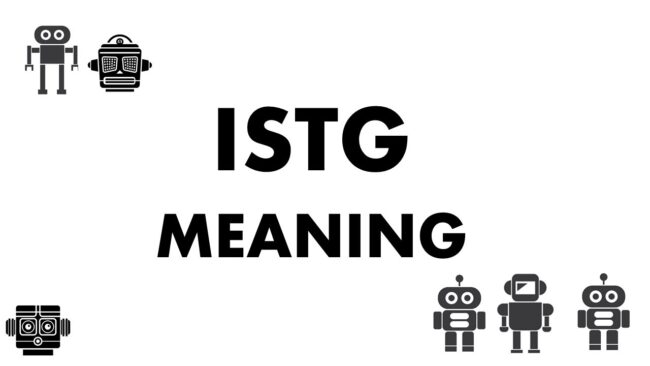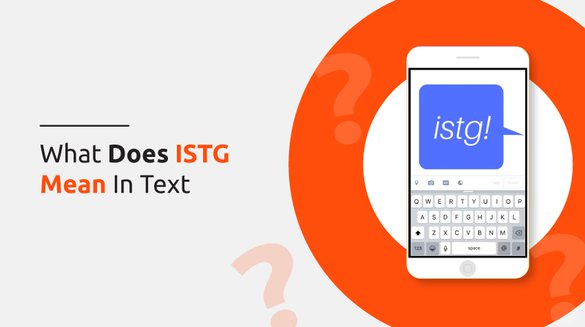Introduction In the fast-paced world of digital communication, acronyms and abbreviations are everywhere. One popular term you’ve likely seen on s
Introduction
In the fast-paced world of digital communication, acronyms and abbreviations are everywhere. One popular term you’ve likely seen on social media, text messages, or chat apps is ISTG. But what exactly does ISTG mean? How is it used, and why has it become so widespread?
This article will explore everything about ISTG — its meaning, origins, uses, and tips for correctly using it in your daily conversations. Whether you’re new to internet slang or just curious, this guide will help you understand and confidently use ISTG.
What Does ISTG Mean?
ISTG stands for “I Swear To God.”
This phrase is commonly used to express honesty, seriousness, frustration, or strong emotion. When someone types or says ISTG, they are emphasizing that what they are saying is true or that they feel very strongly about it.
It’s an informal way of making a statement more intense or convincing without needing to use the full phrase.
The Origin of ISTG
The phrase “I swear to God” has long been used as a serious oath or promise in English-speaking cultures. Traditionally, it carried significant religious weight, invoking God as a witness to the truthfulness of a statement.
With the advent of texting, instant messaging, and social media, people began shortening common phrases to save time and keystrokes. This gave birth to acronyms like LOL, BRB, OMG — and of course, ISTG.
The abbreviation ISTG became popular mainly among younger internet users who wanted a quick way to add emotional emphasis to their messages.
How is ISTG Used in Everyday Language?
ISTG can be used in a variety of contexts, depending on the speaker’s intent and emotion. Here are some common uses:
1. To Emphasize Honesty
If you want to convince someone that you’re telling the truth, you might say ISTG.
Example:
“ISTG, I didn’t eat your lunch.”
2. To Express Frustration or Anger
When you’re upset or annoyed, ISTG helps underline your feelings.
Example:
“ISTG, if I have to wait in this line any longer, I’m leaving.”
3. To Show Surprise or Shock
You can use ISTG when reacting to something unbelievable or unexpected.
Example:
“ISTG, I can’t believe she won the competition!”
4. To Make a Dramatic Statement
Many people use ISTG humorously or dramatically to exaggerate their emotions.
Example:
“ISTG, if I miss this concert, I’ll be devastated.”
5. As a Warning or Threat
Sometimes ISTG can serve as a serious warning or promise.
Example:
“ISTG, if you don’t return my call, we’re done.”

Understanding the Tone Behind ISTG
Tone is crucial when interpreting or using ISTG because the meaning can shift dramatically depending on how it’s said.
- Serious tone: Conveys genuine honesty or frustration.
- Playful tone: Used humorously or sarcastically.
- Angry tone: Indicates annoyance or warning.
Since written communication lacks vocal cues, it’s important to pay attention to the context or accompanying emojis to fully grasp the tone.
Where Do You Commonly See ISTG?
ISTG is most commonly seen in:
- Text messages among friends and family.
- Social media posts and comments on platforms like Instagram, Twitter, and TikTok.
- Online chats and forums.
- Memes and viral videos to add humor or emphasis.
Its widespread use across platforms reflects how ingrained ISTG has become in internet culture.
Why Do People Love Using ISTG?
People use ISTG because it’s:
- Quick and easy to type.
- Expressive: Adds emotion and emphasis.
- Relatable: Captures everyday feelings like frustration or excitement.
- Trendy: Fits well within current internet slang culture.
It’s a versatile phrase that helps people communicate more expressively in a limited space.
When Should You Avoid Using ISTG?
Despite its popularity, ISTG is not appropriate in every context:
- Professional or formal settings: Avoid ISTG in work emails, business communications, or academic writing.
- Conversations with people who may find it disrespectful: Some religious individuals might take offense because it casually references God.
- With older generations or unfamiliar audiences: ISTG might confuse people who aren’t familiar with internet slang.
Always consider your audience before using ISTG.
Alternatives to ISTG
If ISTG feels too informal or potentially offensive, consider these alternatives:
- “I promise”
- “Honestly”
- “For real”
- “I swear”
- “Believe me”
These options can convey sincerity or emphasis without the religious undertone.
Is ISTG Offensive?
ISTG is not inherently offensive but can be sensitive because it invokes God’s name. Some people, particularly in religious communities, might find it disrespectful or blasphemous to use God’s name casually or as an oath.
In most casual conversations, however, ISTG is understood as slang and is rarely taken literally. It’s wise to be mindful of the context and the people you are communicating with.
Examples of ISTG in Conversations
Example 1:
Friend 1: “Did you really eat my last slice of pizza?”
Friend 2: “ISTG I didn’t touch it!”
Example 2:
Sibling 1: “You broke my phone?”
Sibling 2: “ISTG it was an accident!”
Example 3:
Social media comment: “ISTG, this is the funniest video I’ve seen all day!”
Example 4:
Text message: “ISTG, if the Wi-Fi goes out again, I’m done with this place.”
The Future of ISTG and Internet Slang
As communication continues to evolve, acronyms like ISTG will remain popular because they fit perfectly into the fast, casual style of digital interaction.
With new apps, platforms, and cultural shifts, slang will adapt and change, but the core need to express emotions quickly and effectively will keep abbreviations like ISTG relevant.
Conclusion
ISTG, meaning “I Swear To God,” is a widely used slang term that adds emphasis, sincerity, or frustration to digital conversations. It’s a quick and expressive way to make statements more impactful in informal settings.
While it’s great for casual chats and social media, it’s important to be mindful of where and how you use ISTG, considering the tone and audience. Understanding ISTG not only helps you decode modern slang but also allows you to communicate more naturally in today’s digital world.
Frequently Asked Questions (FAQs)
Q1: What does ISTG mean?
A: ISTG stands for “I Swear To God.” It’s used to emphasize honesty or strong emotion.
Q2: Is ISTG rude?
A: It’s generally not rude, but because it references God, some people may find it inappropriate in certain contexts.
Q3: Can I use ISTG in professional communication?
A: No, it’s best to avoid ISTG in professional or formal settings.
Q4: Who uses ISTG the most?
A: It is most popular among teenagers and young adults on social media and messaging apps.
Q5: How do you pronounce ISTG?
A: Usually, people say the full phrase “I swear to God” rather than spelling out the letters.
Q6: Are there alternatives to ISTG?
A: Yes, alternatives include “I promise,” “Honestly,” “For real,” or “I swear.”
Q7: Is ISTG used worldwide?
A: ISTG is mainly used in English-speaking online communities but is widely recognized globally due to internet culture.
Q8: Can ISTG be used jokingly?
A: Yes, many people use ISTG humorously or dramatically for fun.
More Info: onlinemrkting




COMMENTS